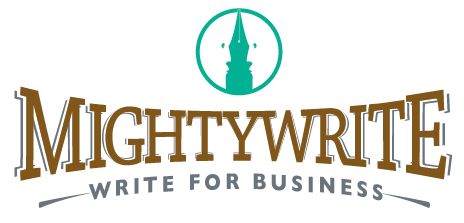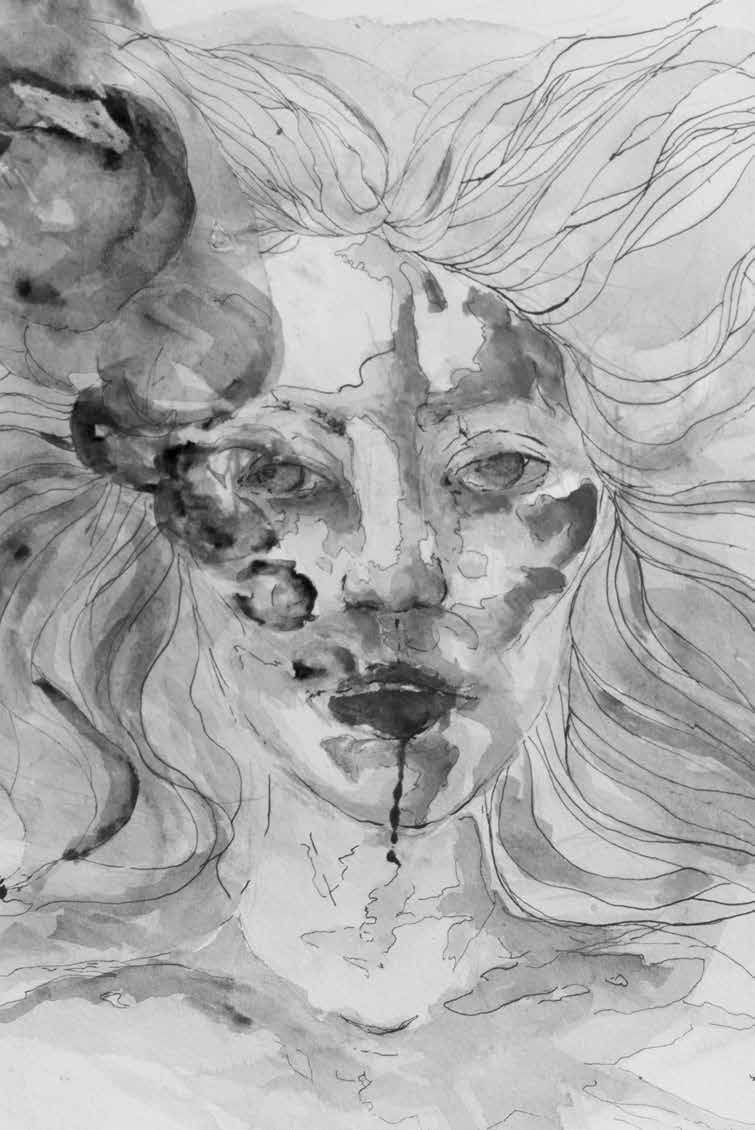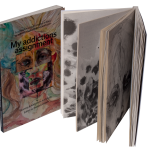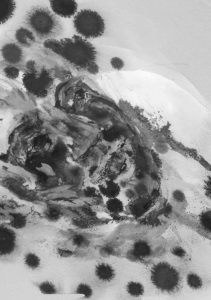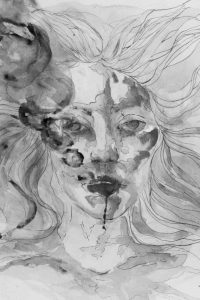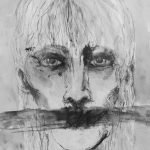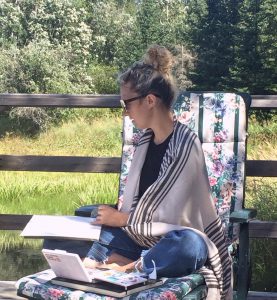This summer, I’ll be featuring the work and unique journeys of some amazing young people who have inspired me with their grace and fearlessness, as much as with their talent.
It’s likely not surprising to many of my friends and colleagues that I’m starting with my eldest, Everette Fournier (they/them), a student at the Nova Scotia College of Art & Design (NSCAD). During their first year away at school, Everette took on a project, with their father, illustrating a book to help pay her tuition. This was no small accomplishment while they were also settling into a new life thousands of miles away from their family and friends.
“My addictions assignment” is a collection of short stories written by nursing students at Red River College (RRC) in Winnipeg. Addiction has impacted our family as it has so many others.
The stunning images Everette created convey this as well as wisdom beyond her years.
To get started, Everette spent a lot of time reading and re-reading the stories that the students had written. They say it was a tough read. Evelyn Lundeen, RN, BN, MN, who is the nursing instructor that had assigned the project and later edited the book, said she quickly realized that the stories many of the students submitted weren’t fiction. “They were writing about their father, mother, son, daughter, sister, brother, niece, nephew, grandma or grandpa,” she says. Evelyn notes that these are the words that describe people living with addiction – not “Boozer,” “Wino,” or “Junkie.”
The more they read, the deeper Everette knew they were going to have to go to get the images right.
“I was looking to create images that spoke to what was happening in the stories but wanted to distort them in a way that aligned with what the distortion of this disease might look like for someone who is going through it,” they said. This meant staying away from the obvious and fragmenting the images so that they became more dramatic and abstract.
“I don’t really know how that feels because I haven’t had addiction but I’ve seen it in my life,” they said. As part of their research, they interviewed people from Alcoholics Anonymous, asking them to describe what they saw when they thought about some of the things being depicted in the stories.
“There’s one about someone being encompassed in water and feeling dead,” Everette said (The Beach, page 61). “What really stuck with me in this story was how the writer talked about feeling far away from herself and her family.” The story resonated with them because it didn’t only speak to addiction, but also mental health. Everette has experienced mental health issues related to anxiety and describes it this way. “When things happen at a rate you can’t process, you just become farther and farther away from who you are and what you want. I can be pulled back when I’m so far under mentally, but if I was dealing with an addiction in that process, I’m not sure I’d ever get back.” Their goal with this particular image was to capture that feeling of literally being underwater, isolated and alone.
To protect their own mental health, Everette had to separate themself from the stories because they were so visceral. “There’s a lot of emotional content that goes into all of the work I do and sometimes you just have to focus on the making of it, while putting those emotions aside.” They explain that for this project they thought about how far they would be able to get with an addiction like those described in the book. “Because I don’t have that experience I didn’t want to assume how being in those situations was for someone. It was really important for me to try and put myself into their heads to visualize what they might be going through.”
Everette adds, “I had an idea of what I was going to do in my medium, which was mostly ink and watercolor and drawing. I wanted to allow the medium to take control. There isn’t a system in place to represent this well so it’s very reactionary, while at the same time being very thoughtful.”
Everette says describing what they ultimately wanted to achieve is difficult. “I don’t want to dictate what people see or how they feel from what I created,” they said. “I wanted to put something out there and hope that people see what they can relate to in that image.”
While all of the stories are unique, there are some disturbing, consistent themes. “It’s unbelievable how many parents and children there were in the stories,” they said. “The reoccurring theme was despair.”
They also observed how the stories were all different and “raw” because they weren’t written to be a storybook.
“There’s no fantasizing. These stories were exactly what people felt or saw or experienced or didn’t experience but understood. That was the beauty of it.”
Everette believes that the book achieved its goal, which was to help nursing students develop the “art of caring” for patients struggling with issues like addiction.
“I think it does something really unique. There’s a lot of issues people deal with that are put into academia. We need to remember there can be empathy and compassion and that these are people not just a statistic. You’re walking into people’s lives and experiences and you are a caregiver. It doesn’t matter where their experience comes from. These people need help and you’re signing up to be in a position to help them.”
Everette likes that the book doesn’t read like an academic essay.
“Hearing about people who don’t have anywhere else to turn because sometimes you can’t save yourself no matter how hard you try – that’s the best way to get others like doctors, nurses, caregivers, or human beings in general to have more compassion for what other people are going through.”
Never assuming what someone else has been through is something Everette has always lived by. It helped inform this work.
“Nobody wants to be at rock bottom. But we’ve all had moments when we could have been pushed that far.”
You can read more about the “My addictions assignment” book project and find out how to get a book here. Money raised through book sales will go toward a scholarship for a nursing student who is looking to specialize in substance use disorders.
All of the illustrations shown are original works and may not be reproduced in any way. The illustrations were done under the name Angela Fournier. All rights reserved.
“My addictions assignment” book design by Michael Fournier.




I’d love to hear your thoughts on this or any of my stories! Please leave a comment below, reach me directly at leanne@mightywrite.ca or on social media
